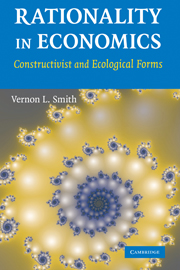Book contents
- Frontmatter
- Contents
- Preface
- Acknowledgments
- Introduction
- PART I RATIONALITY, MARKETS, AND INSTITUTIONS
- 1 Rediscovering the Scottish Philosophers
- 2 On Two Forms of Rationality
- PART II IMPERSONAL EXCHANGE: THE EXTENDED ORDER OF THE MARKET
- PART III PERSONAL EXCHANGE: THE EXTERNAL ORDER OF SOCIAL EXCHANGE
- PART IV ORDER AND RATIONALITY IN METHOD AND MIND
- References
- Index
1 - Rediscovering the Scottish Philosophers
Published online by Cambridge University Press: 18 May 2010
- Frontmatter
- Contents
- Preface
- Acknowledgments
- Introduction
- PART I RATIONALITY, MARKETS, AND INSTITUTIONS
- 1 Rediscovering the Scottish Philosophers
- 2 On Two Forms of Rationality
- PART II IMPERSONAL EXCHANGE: THE EXTENDED ORDER OF THE MARKET
- PART III PERSONAL EXCHANGE: THE EXTERNAL ORDER OF SOCIAL EXCHANGE
- PART IV ORDER AND RATIONALITY IN METHOD AND MIND
- References
- Index
Summary
… scientific discovery is notoriously guided by many unidentified clues, and so is to an important extent our ultimate decision of accepting the claims of a scientific discovery as valid.
Polanyi (1969, p. 184)Exchange in Social and Economic Order
Historically, a recurrent theme in economics is that the values to which people respond are not confined to those one would expect based on the narrowly defined canons of rationality. These roots go back to Adam Smith, who examined the moral sympathies that characterize natural human sociality in The Theory of Moral Sentiments and the causal foundations of human economic welfare in The Wealth of Nations. Economists are largely untouched by Smith's first great work, which was eclipsed by The Wealth of Nations. It is telling that one of the economic profession's most highly respected historians of economic thought “found these two works in some measure basically inconsistent” (Viner, 1991, p. 250). But Viner's interpretation has been corrected by many reexaminations of Smith's work (see, for example, Montes, 2003; Meardon and Ortmann, 1996; Smith 1998).
These two works are not inconsistent if we recognize that a universal propensity for social exchange is a fundamental distinguishing feature of Homo sapiens, and that it finds expression in two distinct forms: personal exchange in small-group social transactions, and impersonal trade through markets. Thus, Smith was to some extent relying on one behavioral axiom, “the propensity to truck, barter, and exchange one thing for another,” where the objects of trade are interpreted to include not only commercial goods and services but also gifts, assistance, and reciprocal favors out of sympathy, as “Kindness is the parent of kindness” (Smith, 1759/1982, p. 225).
- Type
- Chapter
- Information
- Rationality in EconomicsConstructivist and Ecological Forms, pp. 15 - 23Publisher: Cambridge University PressPrint publication year: 2007



